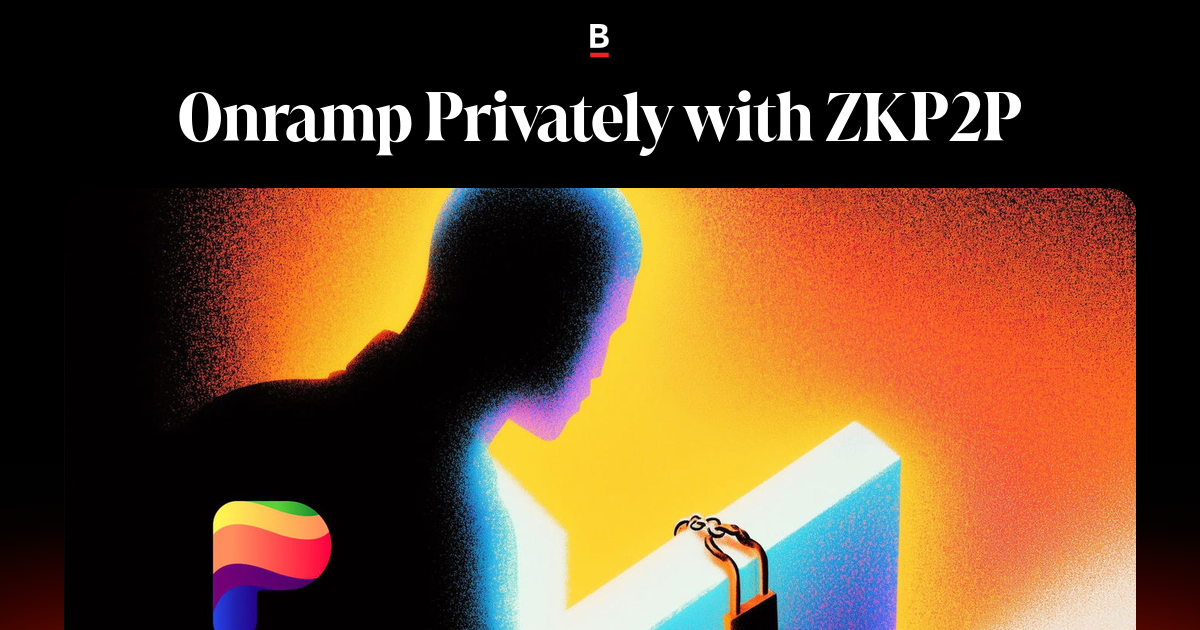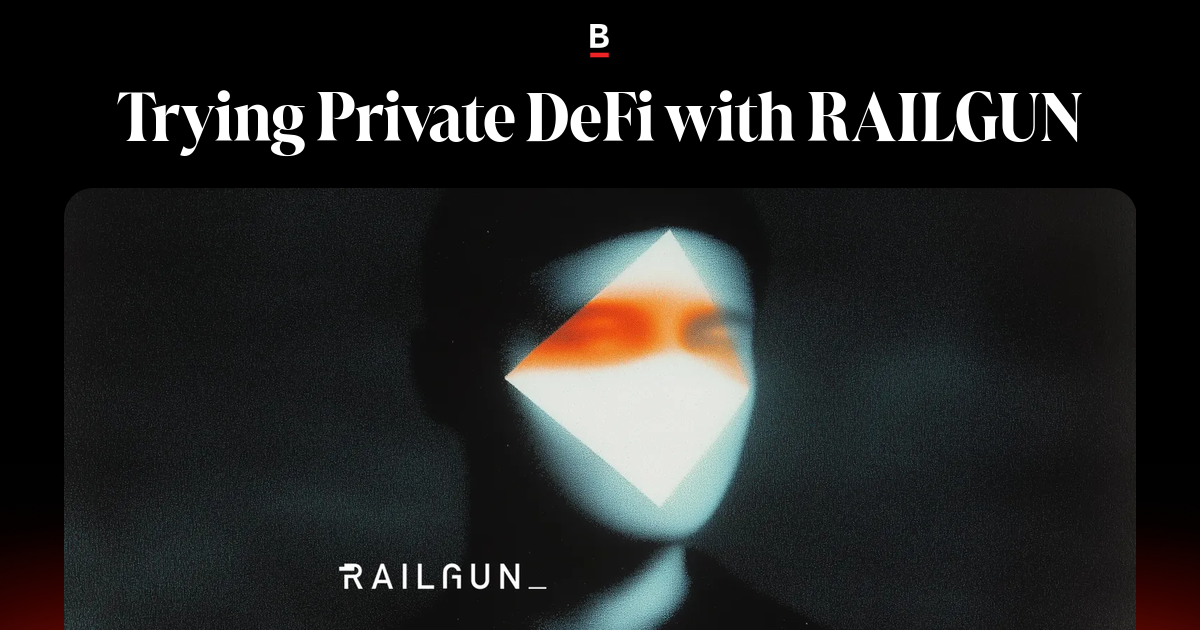
Subscribe to Bankless or sign in
Both onchain and offchain, technology is increasingly being weaponized for surveillance.
This cycle, we've had financial institutions arrive onchain in droves, bringing heightened compliance requirements with them. We have law enforcement and tax agencies worldwide rapidly scaling up their use of blockchain intelligence tools. Offchain, we have initiatives like Palantir's master database representing an unprecedented consolidation of personal information into savvy surveillance systems. Add growing concerns about privacy in the age of AI and the implications become clear — we need privacy.
These latest sagas have thankfully crystallized into a real push for privacy in crypto with a surge in privacy tool development and adoption. It's technology responding to technology.
While transparency and accountability have been hallmarks of blockchains, crypto infrastructure risks becoming an invaluable extension of the surveillance state without robust privacy assurances as well.
Bankless has been covering this subject at an increasing rate, penning overviews of the different Privacy Enhancing Technologies (PETs) in development, and showcasing the starter toolkits to living a more private life onchain.

As savvy users of blockchains, we have an imperative to learn about privacy — both technical education and practical application. Below I've amassed resources for both, put together here at Bankless as well as from organizations whose sole mission is privacy.
Crypto Privacy Resources
To deepen your understanding of privacy and keep track of its developments, I recommend following:
Web3PrivacyNow
An independent, non-profit initiative researching and advocating for Web3 privacy technologies. The organization has built out resources like a free Privacy 101 course on cryptography and an interactive dashboard for mapping and “scoring” privacy projects. If you’re interested and going to DevConnect, they’ve organized “Congress,” a cypherpunk summit on November 16.
Updated Privacy dashboard: https://t.co/R9RmAWaNrn
— Mykola Siusko 🇺🇦 (@nicksvyaznoy) October 15, 2025
New features:
1. Pie charts for visual privacy scoring instead of a 0-100 nominal scale
2. Card system for individual projects
3. Tooltips when hovering over scoring breaks down chart into three categories (Technology,… pic.twitter.com/cTw6ECOcB4
Privacy Stewards of Ethereum (PSE)
Part of the  Ethereum Foundation and arguably the central hub for privacy on Ethereum, PSE focuses on developing privacy solutions through three main tracks: Private Writes (making private onchain actions as easy as public ones), Private Reads (protecting your privacy when checking balances or interacting with Ethereum), and Private Proving (making ZK proofs cheaper and easier to run on mobile devices).
Ethereum Foundation and arguably the central hub for privacy on Ethereum, PSE focuses on developing privacy solutions through three main tracks: Private Writes (making private onchain actions as easy as public ones), Private Reads (protecting your privacy when checking balances or interacting with Ethereum), and Private Proving (making ZK proofs cheaper and easier to run on mobile devices).
Their work includes initiatives like Kohaku wallet development, an Institutional Privacy Task Force for confidential DeFi, and network privacy improvements through private RPC working groups, all available as open-source tools on GitHub and pse.dev

Ludlow Institute
Founded in 2024 by long-time privacy advocate Naomi Brockwell, the Ludlow Institute focuses on advancing digital rights through research, education, and advocacy against privacy threats, advised by experts like Phil Zimmermann, the creator of the PGP encryption system. Resources include "Privacy 101" articles on consent strategies and frequent research on issues of civil liberties and technology.
How did I only just now discover the Ludlow Institute?!
— Nate ⓩ🛡 (@nate_zec) October 6, 2025
Top notch advisory / executive boards + privacy research grants + privacy advocacy == yummy goodness. HT @naomibrockwellhttps://t.co/H7ybb2uqjt
Crypto Privacy Tools to Use
If you’re already well-versed in privacy and looking to integrate privacy tools into your onchain repertoire, check out our guide, How to Live Privately On-Chain, which is also paraphrased below.
On-Ramping Privately
To get onchain privately, you can use ZKP2P and Fluidkey. ZKP2P operates as a peer-to-peer marketplace, using zero-knowledge proofs to verify payments through Venmo, Zelle, or Wise without exposing personal data and offering lower fees than traditional services. Fluidkey, meanwhile, integrates Bridge's banking infrastructure to convert fiat into USDC that lands directly in stealth addresses.

Custodying Assets Privately
For holding assets, Fluidkey automates stealth address generation, creating a new address for every incoming transaction while aggregating balances behind the scenes for ease. Railgun takes a different approach by shielding assets into private 0zk addresses using zero-knowledge proofs across Ethereum, Arbitrum, Polygon, and BNB Chain, providing complete untraceability where sender, receiver, and amounts remain hidden from public view.

Earning Yield Privately
Privacy Pools by 0xbow now doubles as a yield vault through Sky's sUSDS integration while Railgun’s DeFi integrations with Beefy Finance through Railway's frontend lets you put assets to work without exposing holdings.

Transferring Privately
Three options exist depending on your needs. Veil is built for one-time transaction link breaks through zkSNARK-masked pools on Base — ideal for clean breaks when starting fresh. Privacy Pools serves as a compliant intermediary for transfers between addresses. And Railgun offers the only true end-to-end solution, allowing indefinite private transfers between 0zk addresses without repeated unshielding and reshielding, though both parties must use Railgun wallets.

Crypto Privacy Developments to Watch
The above tools represent what's available today, but the privacy landscape continues to evolve rapidly. Several major developments on the horizon promise to expand what's possible for confidential onchain activity.
Aztec's Mainnet Launch
After years of development, Aztec's privacy-first L2 is approaching mainnet. The network enables a privacy-focused execution environment that seamlessly integrates with public logic — meaning encrypted operations and transparent operations can co-exist and interact naturally, opening up new possibilities for more “practical” or everyday applications enhanced by certain private functions.

Kohaku Privacy Wallet
Detailed by David Hoffman this past weekend, the Ethereum Foundation's new reference wallet demonstrates what privacy-first design should look like. Kohaku bundles together features that should be standard — private sending and receiving, IP address protection, per-dapp account isolation, and social recovery via zero-knowledge primitives — into a single cohesive experience. While not made for “mass consumer” use, the fact is that both users and institutions want these protections, and that the development and adoption of Kohaku will provide this foundation.

FHE Tooling for the EVM
One of the most advanced encryption technologies, Fully Homomorphic Encryption (FHE) allows data to be processed without ever being decrypted, meaning sensitive information can remain encrypted even while being analyzed or manipulated. Since all data, when “used,” is currently decrypted, solutions like FHE address the fundamental problem of protecting information during active use. Sadly, this process is extremely computationally intensive and complex. Yet, projects like Fhenix, Zama, and Inco are devoted to closing the performance gap that makes FHE impractical for real-time applications: ![]() Fhenix* recently released a new Threshold FHE Decryption protocol that's slashing latency by 37x, boosting throughput 20K times;
Fhenix* recently released a new Threshold FHE Decryption protocol that's slashing latency by 37x, boosting throughput 20K times; ![]() Zama* currently has its fhEVM live in testing, with mainnet slated for this quarter; and Inco is building a Confidential ERC-20 Framework, letting standard tokens be wrapped into encrypted versions.
Zama* currently has its fhEVM live in testing, with mainnet slated for this quarter; and Inco is building a Confidential ERC-20 Framework, letting standard tokens be wrapped into encrypted versions.
Three things just changed:
— Fhenix (@FhenixIO) October 6, 2025
1/ FHE decryption got 20,000× faster
2/ Private DeFi is unlocked
3/ Fhenix made it happen
READ HOW ↴https://t.co/8fZbB5JJPN
The tools and organizations highlighted here represent just a fraction of what's being built to enable a more private future — gratefully, a whole host of other projects and advocates are working toward the same vision.
And, to be clear, that’s because this work is imperative: without robust privacy options, the transparency that makes blockchains powerful risks being co-opted into surveillance infrastructure at scale. With privacy, or lack thereof, becoming a growing concern across both crypto and the broader tech landscape, privacy solutions, whether ZK or FHE or something else, developed in crypto could serve as a bridge between our industry and mainstream technology — demonstrating yet another way crypto can lead to positive societal change, something the general public needs constant reminders of.
Regardless of how you feel about the privacy of your personal data, in the end, we should all care about privacy on a fundamental level, because we deserve the right to choose what to reveal and to whom we want to reveal it. There’s freedom in that, and freedom is what blockchains were built to protect.












